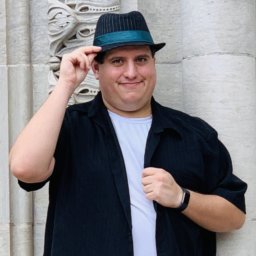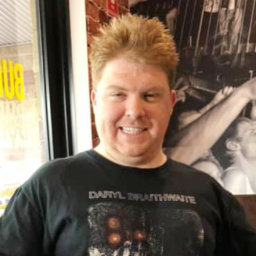WHAT WILL THE NEIGHBORS THINK?
Over my time here working with Spectrum Fusion we have had several conversations about how to encourage our participants to advocate for themselves. It is a persistent problem that hounds those with autism in general. Often, people with ASD are reluctant to put themselves ‘out there’ and speak out on their own behalf because they are afraid of what people will think of them and how they will be treated after it comes out that they are on the spectrum. The threat of stigma and ridicule paralyzes people into silence when it would be nothing but advantageous for them to advocate on their own behalf.
On the one hand, having ASD myself, I can see their point. Despite things slowly getting better for people with ASD, there is still a great deal of stigma against people with autism, and it isn’t helped any by the DSM-V lumping Autism all together into one single diagnosis, removing any and all medical distinctions between individuals with wildly different presentations. That, however, is a topic for another day.
There is still a fair amount of stigma against people with autism, and that makes it incredibly difficult for people who are already sensitive and emotional to advocate for themselves. Some employers are known not to hire people with disabilities because they don’t understand them and worry about how the new employee may act. Some may have the best of intentions trying to accommodate for people with disabilities, but despite their good intentions they begin to act overly gentle and awkward, or even patronizingly around us, thinking they must walk on eggshells and treat us with kid gloves. Some people are simply bigoted and dismissive of those with disabilities because they think them lesser.
THE NEED TO SELF-ADVOCATE IS ESSENTIAL TO CHANGE PERCEPTIONS
Unfortunately, this only makes the need for self-advocacy all the more critical. We can have people advocate on our behalf all we want, but if we cannot step up ourselves and prove that we can join society on a greater, more equal level, it will all mean nothing. If we cannot prove to society that we are worth their time, effort, and attention, then nothing will ever change. Perhaps the more kind-hearted among people will give us a little bit of investment out of pity, but nothing will ever change on a broader scale. What’s more, self-advocacy is not only needed to prove to people that we can engage with society on an equal, more meaningful scale, but it is also necessary to prove it to ourselves.
However, on the note of engaging with society, there is a huge, glaring red flag that must be addressed before we can simply start advocating for ourselves. Self-advocacy, you see, is a complex topic that must be broached with extreme care and cautiousness to avoid falling into certain pitfalls and only making things worse for ourselves. This is not a statement meant to frighten or discourage anyone from advocating for themselves, merely a plea that we should step lightly and consider the facts of our needs and position carefully before making any rash decisions. Indeed, while there are a lot of reasons that we should self-advocate, if we go about it in the wrong way the results can be less than favorable.
The point I am trying to make is that people must be thoughtful and careful as they make their arguments when they advocate for themselves, and they must be sure to advocate from places of strength and worth, rather than simply making demands out of some sense that they deserve ‘restitution.’ And though it may be surprising to those who are depressed about their disabilities, there are absolutely places of strength for you to take comfort in and advocate for.
DIFFERENT, BUT NOT LESS
There was a time right after I was diagnosed with autism when I particularly hated a saying commonly thrown about in the autism community, and that was that people with autism are “Different, but not less.” This was a statement that profoundly puzzled, and even to some extent infuriated me. Shortly after my diagnosis, as I was busy trying to parse through what my disability meant for me, I would become angry whenever anybody tried to comfort me with these words. To me, my diagnosis was a death sentence. It meant that I would never be able to socialize on the same level as other people. I would never be able to feel or think in the same way as others did, and would forever be separated from them because of it. My thinking and feeling were fated to be different in such a profound way that the layman, who would severely inhibit my job prospects and ability to form friendships, would forever see me as strange and off-putting. In essence, I felt I was doomed to be an overemotional, oversensitive ‘manchild’ for the rest of my years, never able to engage with the rest of society on a meaningful and equal level. How in the world, I asked myself, could that be considered anything other than “less?” And indeed, I lashed out at people who tried to use those words in my presence. I saw them as meaningless platitudes, with no value behind them other than to make me feel better despite my irrefutable knowledge of the truth.
And, to some small degree, I cannot say that I was 100% wrong about my feelings at the time. It is unlikely that I will ever be able to think or feel in the same patterns as most other people. It will probably be more difficult for me to make friends, and I’ll probably always be viewed as somewhat “eccentric.” However, the thing I eventually learned was that while what the thoughts I was having were not necessarily false, I did not see the whole picture. And once I was capable of seeing things from a wider standpoint, the statement “different not less” struck me in an entirely different light.
IF AN AVERAGE PERSON IS A SWISS ARMY KNIFE, A PERSON WITH AUTISM IS A SPECIALIZED TOOL
There is an analogy that I like: If your average person is a swiss army knife, then a person with autism is a specialized tool. Most people in the world are capable of multitasking to a high degree, including navigating complex social situations, which might be seen as the basic catch-all ‘knife’ found in a swiss army knife. It is only natural that human beings should be, on the whole, able to socialize with ease. Human beings, after all, are social animals.
People with ASD, however, aren’t swiss army knives. They do not possess the ability to socialize or regulate emotions or break from certain ways of thinking that most people experience. However, unlike the rest of the world, people with ASD are the professional-level electronic screwdrivers, restaurant-quality corkscrews, master-tier woodworking tools, and high-end fabric shears of the world.
These tools are certainly different, but by no means less valuable. In fact, while they aren’t as versatile as a swiss army knife, if you want a job done right then they are far more valuable than such a jack-of-all-trades tool. Though this analogy may be apt, I am not trying to say that we should become narcissistic about this and think of ourselves as somehow “better” than people who aren’t on the spectrum. We are all individuals, and we have different and diverse stories, talents, and backgrounds, and none of us are worthy of scorn based on disability or lack of disability alone.
What I am trying to say, though, is that people with autism tend to hyperfocus and hyperspecialize. We tend to become incredibly interested in and proficient at a particular skill or field, at the expense of most others. One could perhaps see it as something of a trade-off: By becoming incredibly talented and proficient at one field, we sacrifice social skills, some thought, and emotional regulation, and certain levels of flexibility, among other things that commonly afflict people with ASD.
What this means is, with the right amount of self-discovery and introspection to help us discover what it is we are great and proficient at, as well some specialized training and education to help us become even better at our already natural talents, those of us with ASD could become true masters of our fields. We have the capacity, focus, and talent to become great at whatever it is we choose to do, and that’s worth something. Skill and talent is something that’s not only worthy of praise and highly regarded, but it’s something that society actively seeks out.
Speaking realistically, it is unlikely that every one of us will become some sort of great and famous mind lauded throughout history. We are not all cut out for that. What we are, though, are great and valuable specialists that are of use to society and industry at large, and it is not right that we should not be able to find a place in it. It is of disadvantage to us, and it is of disadvantage to the rest of society as well. Unfortunately, because of our lack of social skills, emotional regulation, and our eccentric behaviors, many people are put off by us, denying us a place at the table, and denying themselves of our specialized skills and talents.
And this is where I must start to rain on the parade that I have set up for everybody in this blog where I laud and praise the talents that I have written so far. For you see, one cannot necessarily blame the rest of society for feeling put off and nervous around us.
TIME FOR INTROSPECTION
If you’re on the spectrum and are currently reading this blog, I’d ask you to take a moment to introspect and think for a moment about yourself and your personal history. Have you ever completely missed a joke or a chance to bond or a social cue during a crucial meeting? Have you ever accidentally gotten too passionate or angry or sad about something that came up in casual conversation? Have you ever had anything that could be described as a meltdown or a panic attack in a public place? Have you ever taken something too personally or too seriously and strained a conversation?
Earlier in this blog, there are several keywords that I’ve brought up that are very important. Firstly is that we need to engage with society on an equal and meaningful scale. I also made the point that we cannot become narcissistic about our abilities or that we should somehow see people who are neurotypical as less than us. Lastly, I pointed out that human beings are naturally social animals, and by and large, the average, neurotypical human being is wired to recognize and understand social situations naturally, and that it is not-unreasonably off-putting when another human acts in ways they define as strange.
These and other concepts are ideas that we must take to heart as we recognize that, while ASD does have its benefits, it is still a disability; one that tends to affect our ability to socialize, regulate emotions, and has many other effects that can be naturally seen as off-putting to the average, neurotypical person. And there is no reason that we should think neurotypical people ill for that because human beings are social animals, and a human who cannot socialize on the same capacity as the vast majority of the world is curious, and sometimes off-putting anomaly.
This is why I strongly feel that before we can begin to advocate for ourselves, we must strive to be aware of ourselves.
Perhaps you think that that is not fair, and just because you act in a way they perceive as “strange” does not mean that they should think you somehow off-putting or creepy. However, I would ask you to consider this: All of us, no matter how far we’ve come, is still tethered to our genetics and the baser instincts we developed as wild men when we had to hunt and fight to survive hundreds of thousands of years ago. In those days, ‘different’ was dangerous. Another human being acting strangely could mean any number of things. Perhaps they were sick with rabies, making them act irrationally. Perhaps they were of a rival tribe and would attack at the next opportunity. A neurotypical person being put off by a human acting in a way that is not “normal” is a perfectly natural and understandable response when you take into account the instincts that were genetically programmed into the human population over millions of years of evolution. It is an inescapable part of the human condition.
Is it fair? No, but life rarely is. And sometimes you draw the short straw. And trying to “make life fair” tends to backfire spectacularly. What those of us who drew the short straw can do, though, is better learn to cope with it, self-actualize, and even turn it into an advantage.
Before we can do anything, though, we must be self-aware. Self-awareness is something that must absolutely come before self-advocacy, and before you can advocate for yourself in a way that is meaningful and productive, and properly endears you to the rest of society, you must be aware of your shortcomings. You must also be aware of the way to properly advocate for yourself without putting yourself, as well as other people with ASD, in a disadvantageous, harmful, and even dangerous situation.
THE WRONG KIND OF ADVOCATES CAN GIVE THE RIGHT KIND OF ADVOCATES A BAD NAME
We live in a time of great social unrest where the concept of advocacy has become something of a dirty word, and it is easy to see why. Every day you can turn on the news and see self-styled “advocates” screaming and ranting at people merely trying to go about their daily lives. People block streets, causing commuters who have nothing to do with the problem at hand to be late for work. They throw bottles and cans and sometimes even homemade firebombs at buildings. They riot in the streets, burning cars and breaking windows.
These kinds of “advocates,” who shriek slogans and demand restitution for perceived oppression and who commit violence have caused the very word itself to become one that makes people cringe. What’s more, these sorts of people tend to hurt their causes more than they help them. While it is true that some of the population will be frightened, bullied, and coerced into compliance by these despicable tactics, the vast majority of the public will even side against them on the very issues that they are trying to support .Effectively, these kinds of “advocates” poison the well against their own cause, and make it harder for legitimate, civil discourse to take place, which makes it harder for genuine activists to champion their cause.
Because let’s get one thing straight: These kinds of people are not advocates. They are knee-jerk protestors. They are perceived as whiny, demanding, entitled rabble-rousers. Unfortunately, people who act in this way are usually so entitled, coddled, and lacking in self-awareness that the only thing they can think of to do when they are faced with even the slightest amount of discomfort is to protest violently.
This is what we must not become.
MORE INTROSPECTION
We have to remember that the world does not owe us anything. We are not an oppressed class being forcibly shunted off to work camps or prisons by an oppressive government. And while yes, stigma, bigotry, and misinformation among the public most assuredly exists and must be challenged, many of the problems we face as individuals, as difficult as it is to admit, are of our own making.
Consider your own personal history again. Remember that time you missed a joke or got too passionate or had a meltdown? Your disability was perhaps the underlying reason that it happened, but it was still your own doing that it happened. And while we can request understanding from the people that we affect during these moments, we cannot demand that they ignore it and that we be excused from consequences when we act in such ways.
Are you jobless and spend all of your time in your home away from other people? Do you have difficulty getting a job because of this social anxiety? Unfortunately, even if the underlying reason for this is social anxiety or ASD, we cannot simply demand that we suddenly be given our perfect dream job, citing our disability as a reason for why we should get it.
We cannot demand that people kowtow to our every whim. We cannot order people to start walking on eggshells around us so as not to trigger us or set us off, and then demand people excuse our infractions when something sets us off, and we have a panic attack or meltdown anyway. We cannot demand restitution for oppressions that nobody has levied upon us but ourselves.
Because although it is true that stigma, bigotry, and misinformation are things that exist, many if not most of the problems we face in our lives are of our own doing. We can blame a disability all we want. We can try and say that it is not our fault that we are disabled, and that may be true. But whether we have a disability or not, it is still our fault when we let our emotions get out of hand, when we make poor and irrational decisions, when we let our passions get to our heads, and when we melt down in public.
These tendencies that our disabilities have saddled us with — overemotional tendencies, rigid thinking, propensity towards anxiety, social unawareness, and everything else — these are character flaws. And unfortunately, their source is irrelevant beyond the fact that our disability makes them more chronic and makes it harder for us to deal with them than it may be for a neurotypical person to deal with theirs. This is why we can ask for patience when our flaws come to the surface, just as a neurotypical person might, but we cannot demand that our flaws simply be overlooked because ‘we cannot help it.’
Because the fact is that we can help it. We can be better than this. I’m not going to say that it’s easy, but through self-awareness and introspection, we can devise strategies and methods for us to help us get around the hangups and flaws that we have. It is difficult work. It is uncomfortable and stressful to think about, and it requires a lot of thought, time, and effort. And no, it isn’t fair that it should be so much harder for us than it is for neurotypical people. But that is how the cookie crumbled and nobody can turn back time and magically change it. It is our cross to bear and nobody else’s. And with enough time and effort spent introspecting and coming to understand your own shortcomings and flaws, we can build character and self-actualize to the point where we are less likely to fly off the handle around people, or sequester ourselves away in our safe spaces, or have panic attacks or melt down.
More than anything else, we must be self-aware. We must be aware of our flaws, recognize that they are our burden to take care of, that nobody else can be expected to deal with them for us, and work to fix them, or at least find new ways of coping with them, in the best way that we can. We must be self-aware and self-actualize.
Only then can we be trusted to self-advocate.
ARE YOU READY TO BE AN EFFECTIVE SELF-ADVOCATE?
Unfortunately, this is already not the case. Many “self-advocates” with autism have not taken the time to introspect about themselves and become aware of their own flaws and how they are theirs to deal with. These people, just like the other faux-advocates of other causes, tend to make wild and entitled demands, have an immature “with-us-or-against-us” mentality, and demand that everybody else bear the burden of keeping them happy and content. They scream. They whine. They make outrageous claims like how NT’s (neurotypicals) are always somehow ‘against’ people with autism and how everybody who lacks the disability is actively oppressing them. They level insane accusations against well-intentioned academics who are actively working to try and help them understand their disability, claiming that their research is somehow harming them because it forces them to come face to face with their own flaws as people… which is of course uncomfortable and hurts their feelings. And they absolutely ruin the perception of people with autism among the general public.
These people are, sadly, rampant. It’s gotten to the point that when people think about autism advocates, these are the kinds of people that the general public tends to immediately think of. And you can bet your boots that this kind of supposed “advocacy” is having a terrible effect on people who are calmly and legitimately trying to champion the cause of aiding people with ASD, as well as greatly contributing to the stigma against us and harming the autism community as a whole.
Autism has become a joke on the internet. People with autism are portrayed as witless, bumbling, awkward losers with a complete inability to socialize, holed up in dingy, one-room apartment hovels and likely stroking a body pillow with a perverted-looking anime girl printed on it and whispering romantic nothings to it in place of real social interaction. And unfortunately, the immature actions of un-self-aware “advocates” only exacerbate the issue (as well as the DSM-V lumping everybody with ASD into a single diagnosis, but again, that is a topic for another day).
So how can we fight this perception? The first way is, of course, through self-awareness and self-actualization. If that stereotypical example I mentioned in the previous paragraph above hits a little too close to home, for example, how about instead of writing a nasty comment down below you instead take some time to introspect and think about why that is. Consider your life as it is and consider how you got to where you are. What choices or mistakes have you made in life? How could you be better in the future? What can you do now to change the course of your life? Can you come up with any coping mechanisms to help deal with your individual character flaws that sprang from your root issue of ASD? How can you work to be a better you?
And secondly, we can fight this perception through self-advocacy. Real self-advocacy.
Rather than reinforcing the perceptions of the public by demanding things we have not earned, calling everybody different from us an oppressor, placing the burden of our mental well-being on others, and demanding we be excused from our faults, we must show a different side of ourselves. We must highlight the benefits of having ASD.
Remember back towards the beginning of this blog when I highlighted the things about having autism that made us special. We are focused. We are talented. We are the specialized tools in a world of Swiss army knives. These are the things we need to highlight and the position from which we must self-advocate. Rather than attempting to pull our neurotypical peers down by demanding what we have not earned to compensate for our weaknesses, we must instead build ourselves up as people and then find ways to showcase our strengths.
This is the best way to get people onto our side and to change the greater perception of autism from “socially unaware, overemotional, panicky losers” into “hard-working, talented, focused, and skilled colleagues… who may or may not have a few eccentricities, but they’re aware of that and working on it.”
Part of being self-aware is not only recognizing your flaws, but also recognizing your strengths; the same kinds of strengths we talked about earlier in this blog. When you are self-aware, you can recognize your talents and skills. These are the things we have to offer society. These are the things that people will be incredibly interested in from us. These are our passions and purposes in life. And they are physically, tangibly worth something. If we can become aware of the strengths we have and then self-actualize by engendering their growth through specialized training, study, and practice we can become masters of our chosen fields. This is how we earn respect, friendship, and our place in society.
This is how we will change the greater public perception of people with autism. By individually working to build up our strengths and promote them to the public, rather than forcing the public to compensate for our shortcomings.
WE HAVE TALENTS AND SKILLS THAT THE WORLD NEEDS
Self-advocacy then, in this context, takes an incredibly different form than what the general public perception of “advocacy” has become. In this new form, the best way we can self-advocate is essentially by humbly, respectfully, and politely asking the world for a “moment of its time.” It is acknowledging the difficulty of living with autism and the character flaws the disability engenders, but assuring the world that we are working on coping mechanisms to curb those flaws and that we will do our best to minimize how often they appear in daily life, and then backing these promises up. And then, when the world does give us a moment of its time, it is proving to the world that our special skills are real. Our skills are unique, exceptional, and profitable, and they are worth investing their time and effort.
It will take time, and it will not be easy. The stigma and bigotry exists and it shall have to be challenged, but we must be sure to challenge it in a calm and respectful way that does not reinforce the current public perception of ASD through tantrums and demands. Give it enough time and patience and we will chip it down and wear it away. The process will be sped up as people continue to discover the hidden talents and skills of people with autism, working skillfully and professionally and contributing just as much as the swiss-army-knives of the world do. Slowly but surely the greater perception of autism will change.
It will take time. It will take patience. It will take blood and sweat and tears. It will take boatloads of effort, and it will be an uncomfortable, emotional, tiring process. But we can do it.
…But only if we have the guts to look inside of ourselves, grow as people, and resolve to do it right.






